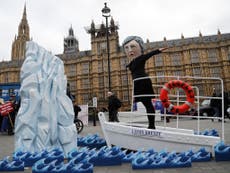Paradoxically, Theresa May’s devastating Brexit defeat makes life harder for Jeremy Corbyn
Both party leaders are playing for time, trying to paper over the cracks within their own ranks – but decisiveness is needed now more than ever

It shows how desperate Theresa May’s plight has become that she can take some comfort from facing tonight’s vote of no confidence in her government. This parliamentary nuclear option is deployed only rarely by opposition parties, when there is a prospect of government collapse. May is in such a deep crisis over Brexit that surviving the confidence vote – which she will win, with the help of Tory Eurosceptics and the Democratic Unionist Party – will provide a brief respite and a fleeting moment of Tory unity.
But it won’t last, and there will almost certainly be more confidence votes in the coming weeks. May could conceivably lose one and be forced into a general election unless she rules out a no-deal Brexit at the end of March. Many anxious businesses will want her to do that to end the uncertainty following last night’s historic, crushing defeat for her deal.
If she refuses, some Tory MPs will threaten to vote with opposition parties in another confidence vote in a last-ditch attempt to avoid the cliff edge.
For now, the prime minister is siding with the 10 ministers who told yesterday’s cabinet meeting that no deal should not be taken off the table. May denies she is running down the clock to 29 March, but some opponents of a crash-out suspect she is – as do some Eurosceptics who want one.
With the cabinet split, and other ministers urging May to pivot to a soft Brexit, it will fall to parliament to head off a no-deal departure by insisting on an extension to the two-year Article 50 process. After shooting down May’s deal last night, they must now switch off its life-support machine. May’s uncompromising response shows that she does not admit it is dead. While promising cross-party talks starting tomorrow, she is demanding “negotiable” solutions – in other words, something close to the withdrawal agreement she has struck with the EU.
Her efforts will go into rewriting the non-binding political declaration on the long-term UK-EU relationship rather than the withdrawal deal. She is clinging to her red lines, including an independent trade policy. That would rule out a permanent customs union, even though several cabinet ministers believe swallowing that could break the Commons deadlock. Her plan B looks remarkably like plan A.
The prime minister is unlikely to suddenly become a consensual figure. She wants to talk to “senior parliamentarians” but is unlikely to invite Jeremy Corbyn. If she really wants to find out what parliament is for, rather than what it is against, she should allow MPs indicative votes on the Brexit options to test support for them. They should include a Final Say referendum; a customs union; a Norway-plus plan inside the single market and a customs union; and a Canada-style free trade deal.
But May is against such a series of votes. Again, the Commons must insist on them after she makes her formal response to her defeat next Monday.
MPs will have to compromise, too. At Westminster last night, I saw smiles on the faces of ardent Remainers and hardline Brexiteers alike after the vote. Their dream of their perfect Brexit is still alive. May tried to go down the middle of the road and got run over. Now she will have to choose which side to be on. The parliamentary arithmetic points her to a soft Brexit.
The plan by Tory MP Nick Boles for MPs to seize control of the Brexit process is welcome. But it must not become a vehicle solely for his pet Norway-plus scheme and a backdoor way to head off a referendum. There should be a fair fight between a permanent customs union, Norway-plus, a Canada-style trade agreement and a Final Say vote.
Almost 100 Labour MPs will soon come out for a referendum in a letter, to try to push Corbyn into implementing his party’s policy, agreed at its conference last September. Several dozen others have pledged private support to the People’s Vote campaign. It seems that Corbyn will play for time, and try to maintain his party’s fragile unity by staging a series of confidence votes. He wants to avoid either facilitating or blocking Brexit but he, like May, may soon have to choose.
However, the scale of May’s defeat could make life difficult for Corbyn. Opponents of Brexit believe it can now go ahead only if Labour support it or abstains. May might peel off some Labour MPs who, after voting against her on today’s confidence motion, might feel less constrained to toe their party’s line in future Brexit votes. But she needs to win over 116 MPs who opposed her last night, and so might need Labour frontbench backing to get over the line. Labour would then share ownership of Brexit.
Referendum supporters believe last night’s numbers make it harder for the rival Norway-plus group. “If MPs hate this deal, they hate Norway even more,” one said. “It would probably need both front benches to whip for it to go through now.”
With May’s deal sunk, the battle is now on between backers of Norway-plus, a customs union and a referendum for their plan to become the alternative to a disastrous no-deal Brexit, which the cabinet and parliament will surely not allow.




Join our commenting forum
Join thought-provoking conversations, follow other Independent readers and see their replies